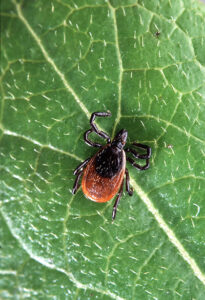Research finds ticks can survive cold winter temperatures in the right conditions

Winter cold may not be what’s keeping ticks from spreading north in Maine, a new University of Maine study co-authored by Allison Gardner finds. Gardner is an assistant professor of arthropod vector biology and Mitchell Center Faculty Fellow. The research shows that blacklegged tick nymphs are able to survive inhospitably cold winter temperatures with insulation from leaf litter and snow pack, which may lead to an expansion of their range into northern Maine as climate change leads to warmer and wetter winters.
“The findings of this study suggest that the impact of low temperatures on overwinter survival may not be the single factor limiting blacklegged tick populations in northern Maine,” Gardner says. “While climate change likely has some role in the geographic range expansion of ticks in the state, the ecological mechanisms limiting the spread of the blacklegged tick likely are very complex.”
The study was published in the journal Ticks and Tick-borne Diseases.
Ticks can survive cold winter temperatures in the right conditions, UMaine research finds
